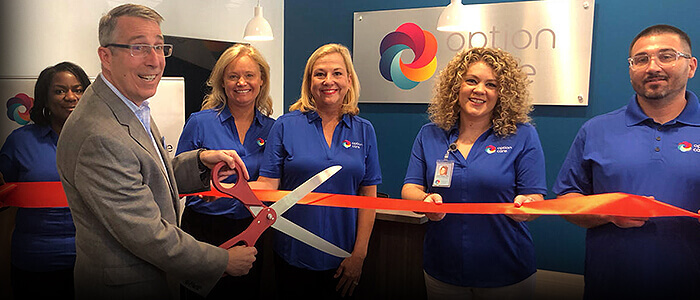
Новые результаты анализа данных Option Care подтверждают, что пациенты с сердечной недостаточностью, проходящие инотропную инфузионную терапию на дому в дополнение к правильно подобранной лекарственной терапии, имеют более высокий процент выживаемости
By: Option Care
May 16, 2018
БЭННОКБЕРН, Иллинойс, 16 мая 2018 г. — Survival may improve when advanced heart failure patients receiving home infusion of inotropic therapy are also receiving guideline-directed care, suggest results of a large study recently published in The Journal of Heart and Lung Transplantation.[*]Havakuk O, Tran J, Artig-Brown T, et al. Intravenous inotropes, beta blockers and survival in ambulatory heart failure patients — a contemporary study in 3,311 patients. J Heart Lung Transplant. 2018;37(4)(suppl):S202. The study was conducted by investigators from Keck School of Medicine of USC and Option Care Health, the nation’s largest independent provider of home and alternate treatment site infusion services.
Patients with advanced heart failure (Stage D) may be prescribed intravenous (IV) inotropic therapy while they await a heart transplant or mechanical circulatory support, or as a palliative measure. The therapy may improve quality of life[*]Walther K, Artig-Brown T, et al. The impact of home infusion on quality of life in patients with heart failure receiving home inotropic therapy based on the Minnesota Living With Heart Failure Questionnaire. Poster presented at the 2017 National Home Infusion Association (NHIA) Annual Conference & Exposition: May 22-25, 2017; Orlando, Fla. by enabling patients’ hearts to pump more efficiently, which may increase their energy levels and may help them breathe easier. While previous research found that patients receiving inotropic therapy survived an average of three to six months, the study of Option Care data suggests an average survival of more than two years.[*]Hauptman PJ, Mikolajczak P, George A, Mohr et al. Chronic inotropic therapy in end-stage heart failure. Am Heart J. 2006;152:1096 e1-8. [*]Hershberger RE, Nauman D, Walker TL, et al. Care processes and clinical outcomes of continuous outpatient support with inotropes (COSI) in patients with refractory end-stage heart failure. J Card Fail. 2003;9:180-7. Additionally, survival is improved when doctors follow American College of Cardiology Foundation/American Heart Association (ACCF/AHA) guideline recommendations for delivering the therapy, which includes prescribing other medications such as beta blockers.
“Advanced heart failure patients suffer from extreme fatigue and poor quality of life. Inotropic therapy can make a big difference in their lives, helping them get back to the day-to-day activities that many of us take for granted, such as enjoying time with family,” said Luanda P. Grazette, MD, MPH, principal investigator of the study and associate professor of clinical medicine at the Keck School of Medicine of USC. “As doctors, we sometimes avoid inotropic therapy out of concerns about decreasing survival. Through this research we found that survival on inotropes has improved quite a bit compared to what was observed from studies in the late 1990s and early 2000s. In this study it was not unusual for many patients to live for years on this therapy. This was quite a surprise.”
“Receiving this life-changing therapy in the comfort of home helps patients more fully enjoy their lives,” said Tess Artig-Brown, BSN, MN, co-author of the study and director of Option Care’s Heart Failure Program. “Patients are able to spend more time at home surrounded by family rather than in a hospital or long-term care center where they may be exposed to antibiotic-resistant infections. Home infusion is also much more cost effective than care provided in the hospital or long-term care centers and research has shown that with education and support, these patients are less likely to be readmitted to the hospital.”[*]Meaux N. and Tatiel M. Hospital admission reductions among Stage D heart failure patients participating in a home inotropic infusion program. Poster presented at 7th Annual Meeting of the American Association of Heart Failure Nurses (AAHFN): June 23-25, 2011; Seattle.
На сегодня эта работа, результаты который были представлены на 38й Ежегодной научной конференции Международного общества трансплантации сердца и легких в Ницце (Франция), является самым крупным исследованием в области долгосрочного применения инотропной терапии.
В нем приняли участие 3 296 пациентов с сердечной недостаточностью на поздних стадиях заболевания, проходившие инотропную терапию в период с мая 2009 года по июнь 2016 года. Общая приведенная медианная выживаемость на длительной инотропной терапии составила 771 день. Среднее время на инотропной терапии составило 171,2 дня с минимальной продолжительностью один день и максимальной продолжительностью 2 204 дня. Большинство пациентов — 2 300 человек (69,8 %) — получали милринон, 942 человека (28,6 %) — добутамин, а 54 человека (1,6 %) — допамин. В результате терапии бета-адреноблокаторами, применявшейся у 799 пациентов (24,2 %), смертность снижалась на 50 %.
Earlier studies reported a higher mortality rate among patients on inotropic therapy, but they were conducted when the treatment practices were different, including bolusing (providing a large initial dose) — which has since been determined to be too taxing for the heart — followed by continuous infusion at much higher doses than what is currently used. Most physicians now start patients on the lowest dose and increase it slowly to achieve the desired result. The guidelines note it’s important that prior to advancing to Stage D, heart failure patients are prescribed oral and mechanical therapies as appropriate, such as beta blockers, angiotensin-converting enzyme (ACE) inhibitors or implantable cardioverter defibrillators (ICDs).
О компании Option Care
Option Care Enterprises, Inc. (Option Care) is the nation’s largest and most trusted provider of home and alternate treatment site infusion services. An industry leader, the company draws on nearly 40 years of clinical care experience to offer patient-centered therapy management. Option Care’s signature Home Infusion Plus services include the clinical management of infusion medicines, nursing support and care coordination. Option Care’s multidisciplinary team of more than 1,800 clinicians — including pharmacists, nurses and dietitians — are able to provide home infusion service coverage for nearly all patients across the United States needing treatment for complex and chronic conditions. Learn more at www.OptionCareHealth.com.


